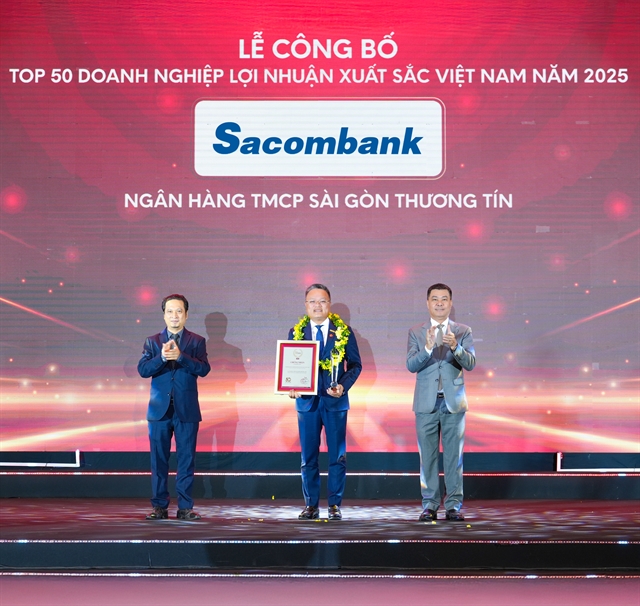 Features
Features

Trần Khánh An
Before she ever managed the Sáng Laundry shop, Phạm Thị Thúy often felt like she was living in silence – not just because she was hearing impaired, but because the world around her rarely made space for her voice.
"Before this, I worked at various other companies, but I always felt invisible and alone," she recalled.
"I sat on the sidelines, unable to understand or be part of conversations. There was no room for me to grow or find real opportunities to develop my career. I was just stuck in place."
Her story reflects a broader reality facing seven million people with disabilities in Việt Nam, where employment – let alone inclusive employment – is still out of reach for many.
According to the 2023 National Survey on Persons with Disabilities conducted by the General Statistics Office, the employment rate for people with disabilities is 23,9 per cent, far below that of non-disabled people at 77.4 per cent.
Access to vocational training is even more limited, with only 8.8 per cent of people with disabilities of working age having the chance to receive any form of job training.
Built for inclusion
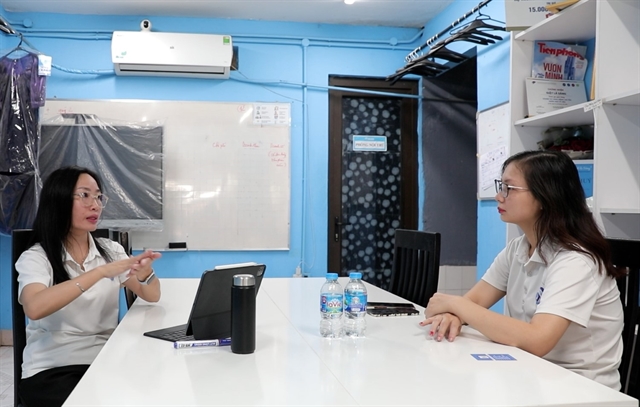 |
| Phạm Thị Thúy (right), the shop manager, talks with Lương Thị Kiều Thúy, founder and CEO of Sáng Group Social Franchise, about business performance. VNS Photo Bảo Long |
However, things changed when Phạm Thúy joined Sáng Laundry five years ago, becoming one of the first employees, and now she is the manager.
At Sáng Laundry, a franchise run entirely by deaf and hearing-impaired staff, everything is designed differently from the ground up. From day-to-day operations to vocational training, the system is built to support them in mastering the laundry business.
For example, point-of-sale materials replace spoken instructions, allowing for seamless interaction without words between customers and employees.
"Customers know that I am deaf from the beginning. They never make a big deal out of it," Phạm Thúy said.
As a social enterprise, every bit of profit from the laundry goes back into personal and professional development programmes for the community, creating learning opportunities that are still rare for many people like Phạm Thúy.
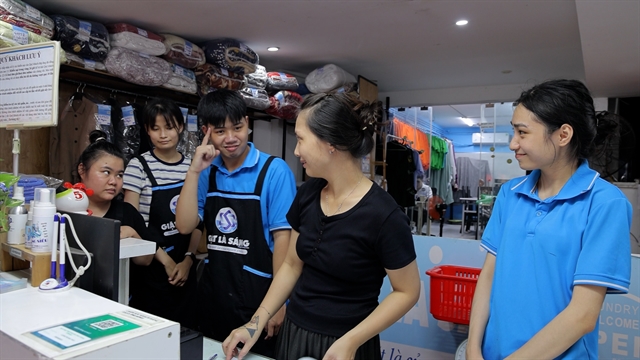 |
| As part of her role, Phạm Thị Thúy (2nd right) mentors and trains new team members. VNS Photo Trần Khánh An |
Over the past five years, her confidence has grown in tandem with the business.
"As I gain more experience, people start to see me differently – as someone capable," she said. "I feel respected by other employees. I learned how to communicate more effectively with customers. People outside have also noticed my growth and admire that I have stayed here for five years."
For Phạm Thúy, joining Sáng was the beginning of a transformation. "I feel like now I have a clear identity," she smiled. "People know who I am and what I do."
Phạm Thúy’s journey shows why inclusive employment is at the heart of Sáng Laundry's mission.
Lương Thị Kiều Thúy, founder and CEO of Sáng Group Social Franchise, who is also hearing-impaired, said: "When you commit to serving a community, your focus must be on solving its core challenge – which, for people with disabilities, is employment."
"When the employment issue is addressed, even with small steps, it can create ripple effects and change the mindset of not only the workers themselves, but also their families and social circles around them," she added.
Dignity, not sympathy
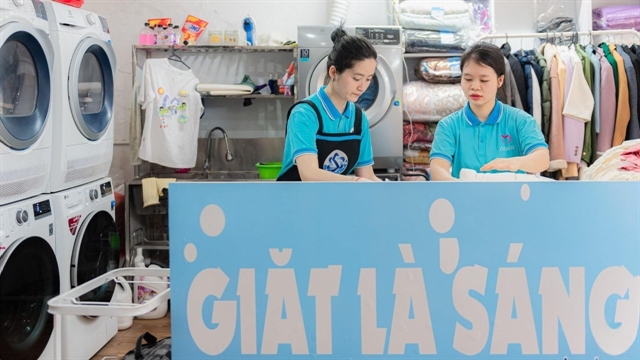 |
| At Sáng Laundry, employees actively participate in every stage of the shop’s daily operations, gaining hands-on experience while building essential soft skills such as teamwork, communication, and customer service. Photo courtesy of Sáng Laundry |
However, at Sáng, employment is not about filling roles for the sake of diversity.
The key to Phạm Thúy and her colleagues' growth and confidence comes from Sáng’s bold philosophy: employment should not be based on charity, but on a sustainable, market-driven model where people with disabilities are equal and capable contributors.
Sáng Laundry operates as a for-profit social enterprise, not relying on donations or subsidies. It operates like any other laundry, charging market rates and reinvesting its profits into training and expansion.
Customers come to Sáng Laundry not out of pity, but for the quality, professionalism and trust the service has earned – standards that the staff themselves work hard to uphold.
"I always tell my staff that customer loyalty is earned through the quality of our service, not through sympathy for our disabilities," Kiều Thúy said.
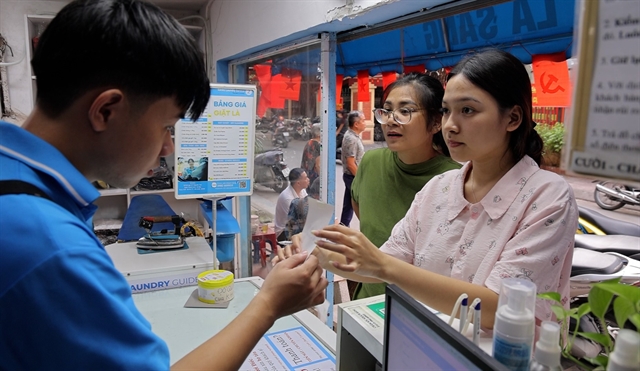 |
| At Sáng Laundry, point-of-sale materials replace verbal communication, enabling smooth written interactions that help employees build confidence and customer service skills. VNS Photo Trần Khánh An |
Far from being passive recipients of help, they manage daily operations, train new hires, and communicate directly with customers, proving that they are here to contribute – and lead.
Since its founding, the model has grown from Hà Nội to HCM City and Đồng Nai Province, with a total of five shops now in operation. It generates monthly revenues of VNĐ40-60 million (US$1,500-2,300) per store while creating stable jobs for about 25 persons.
These successful results, demonstrating scalability and sustainable profitability, show that inclusion can indeed go hand in hand with profitability and effectiveness.
Beyond employment
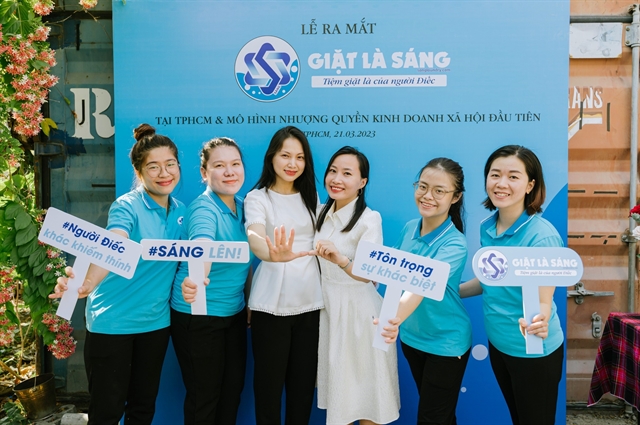 |
| Sáng Laundry staff at the opening of the new store in Hồ Chí Minh City. Photo courtesy of Sáng Laundry |
Most importantly, Sáng's success lies in its vision of true inclusive employment – one that goes beyond simply offering jobs or filling roles.
It is about empowering people, giving them ownership and genuine responsibility in shaping the organisation's future, just as PhạmThúy has been empowered to do.
"I hope that one day the staff at Sáng will run businesses of their own," Kiều Thúy said.
"To grow a social enterprise, empowerment must come first. When people with disabilities take leadership roles and co-own social enterprises, their voices are better represented," she explained.
"They are not only leading the organisation but also driving social change – created both by and for them."
This vision underpins Sáng Laundry's ambition: to pioneer social franchising for people with disabilities, whether invisible or visible, mental or physical, and create new opportunities beyond laundry work.
"Our dream is to turn Sáng Laundry into a franchise model so it can reach more disabled communities and help them find other suitable occupations like this," Kiều Thúy said. VNS


